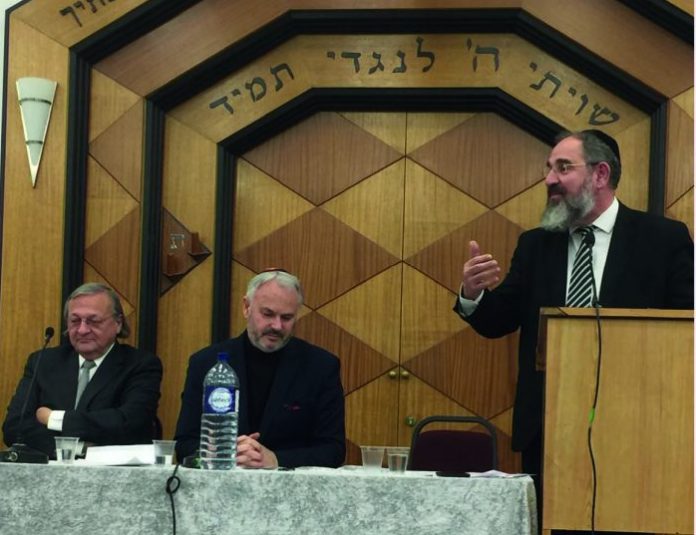
Opinion was divided at the Ner Yisrael Synagogue debate on Sunday over whether a two-state solution is the acceptable and only way forward for peace and security between Israel and Palestinian Arabs. Around 150 people heard Rabbi Alan Kimche speak against the motion, explaining that the Jewish people began their history in Judea and Samaria. “Jewish life centred around the city of Hevron; while King David was crowned in the city.” Th e Rabbi gave the example of people willing to give land for peace “but when you ask them to give away Tel Aviv, the people begin to rethink. But Jews don’t know about our history.” He then told the large mixed crowd, “If we have a claim to live in Israel, then it is Judea and Samaria, the heartland of the Jewish people.” Ambassador of Israel to UNESCO, David Kornbluth, who is a lawyer and former negotiator with the Arab states, disagreed and said there must be a Palestinian state in those territories. “A Peace treaty has to come to Palestine and Palestinians have to
have somewhere to live.” When a member of the audience asked why he thought it was acceptable for Arabs to live in Israel but not one Jew would be allowed to live in this state of Palestine, the Ambassador replied that everything that will preserve life must be done. “It’s not land for peace, it is land for life,” he said. Former diplomatic editor and foreign correspondent for Sky News, Tim Marshall, did a good job in moderating the debate with a few jokes thrown in, although he had to remind one or two people not to give statements but ask straightforward questions. The two panellists were also reminded a few times to give brief answers. Judging by the reaction, the majority of people supported Rabbi Kimche’s words, although many in the audience did not know enough about the Middle East and its complex changing demographics along with the growing radical views within the Islamic world.
OPINION
It’s hard to believe the Oslo agreement was signed by the late Prime Minister Yitzhak Rabin and PLO leader Yasser Arafat way back on September 13, 1993. Almost 24 years later, the agreement to end the Israel Palestinian conflict through recognition and territorial concessions is practically dead. Israel recognized the PLO as the official voice of the Palestinian people, giving them land, arms, money and red-carpet treatment. In return, Arafat wrote a letter to Rabin saying he recognised Israel, but he regularly called for Jihad in Arabic. Arafat was regularly in contact with Sheikh Ahmed Ismail Hassan Yassin, the founder of Hamas, in a race to determine which organization could produce the highest number of attackers against Israelis. In 2002, Fatah Al Aksa, led by Arafat who paid the group $50,000 per month, were responsible for more suicide bombings in Israel than Hamas or Islamic Jihad. The PLO turned down what President Clinton described as the best deal one could ever hope for. Arafat’s successor, Abbas, turned down an even greater deal in 2005 and 2007. Why? It is not about settlements and never was. It is about the
PLO charter that calls for Israel’s destruction in any form and which was never officially annulled. It is about the refusal of the Palestinians to set up a state alongside Israel. Today, with radical Islam on the rise and on Israel’s borders, it would be suicidal to seriously consider a two-state solution as the solution. We already have Israel, Hamas in Gaza and the Kingdom of Jordan, which by the way is dealing with its own Islamic terrorism. The answer is to incorporate into Israeli society those Palestinian Arabs who wish to become Israeli citizens. There are currently just under 1.8 million Israeli Arab citizens, of which more voted for the Likud than the Labor Party in the 2015 election. It is time to rethink the strategy and pursue new solutions, because after almost 24 years, two states is clearly not the answer. Especially as the PLO under Abbas refuses to even talk to Israel.
To comment or reply to James, write in to: letters@thejewishweekly.com









